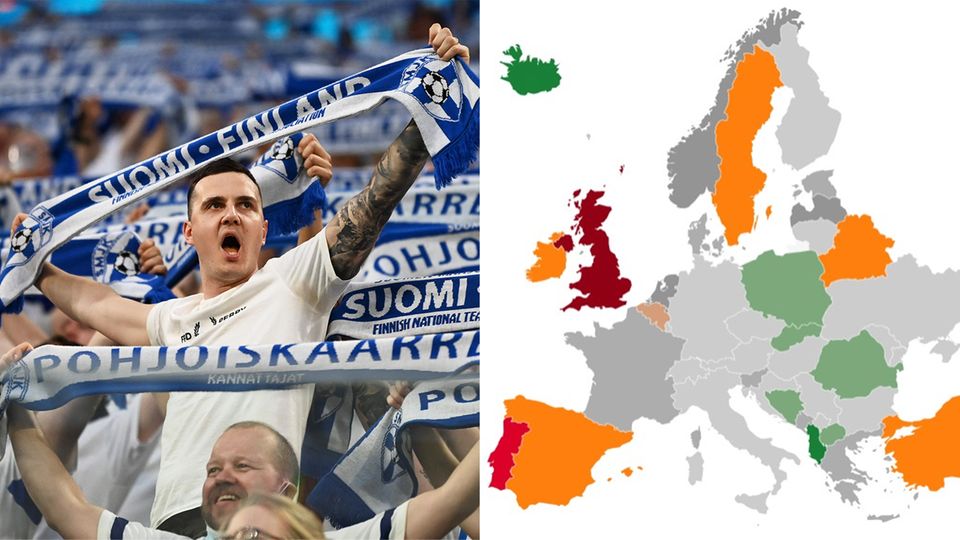The hope for herd immunity is almost as old as the corona pandemic. Among other things, more contagious virus variants such as Delta leave question marks behind it.
The pandemic ends with the onset of herd immunity – the hopes in the minds of many people should look like this or something similar. Increasingly, however, experts are making it clear that it is not that simple. Some doubt that herd immunity can even be achieved with the coronavirus. An overview.
Herd immunity – what is it anyway?
The term has several meanings. The corona debate in Germany usually means that a sufficient number of people have become immune after being vaccinated or infected to slow down the spread of the pathogen. The idea is that the virus will then get less to those who are still susceptible. Such community protection would benefit people who cannot be vaccinated for medical reasons. It is now extremely unlikely that the virus can ever be eradicated.
The Charité virologist Christian Drosten told the Swiss online magazine “Republik” at the beginning of June: “That was a misunderstanding from the start, if you took it to mean that herd immunity means: 70 percent become immune – regardless of whether through vaccination or Infection – and the remaining 30 percent will no longer have any contact with the virus. ”
How Much Immune People Does Herd Immunity Take?
There is no one-size-fits-all answer to that. How high the rate has to be also differs depending on the illness; for highly contagious measles, around 95 percent is the threshold value. In the case of Corona, experts have put the proportion at around two thirds of the population since spring 2020. It was based on the assumption that an infected person infects an average of three people if no measures are in place and no one is immune.
But then came more contagious virus variants: Those infected with the alpha variant, which is still predominant in this country, infect more people on average than those infected with previous variants. Therefore, the President of the Robert Koch Institute (RKI), Lothar Wieler, now speaks of a goal of over 80 percent vaccinated and recovered, in order to largely dispense with measures and rules and the number of infections per infected person (R value) still to be kept below 1.
What does the virus variant Delta mean for herd immunity?
According to Carsten Watzl, Secretary General of the German Society for Immunology, the feared spread of the Delta variant in Germany could make it even more difficult to achieve herd immunity. “Delta is a bit more contagious than the currently prevailing virus variant Alpha.” He assumes a threshold of around 85 percent.
“So we get into areas that are difficult to reach as long as there is no approved vaccine for children under the age of 12 and no general vaccination recommendation for everyone under the age of 18. It is possible that herd immunity can only be achieved for individual facilities such as nursing homes. but not for the majority of the population, “said Watzl. In the absence of vaccination options, it also applies to younger students that they initially have no community protection.
What happens if the necessary threshold should be reached?
“Even then there will still be infections and outbreaks will occur, but it can be assumed that with an immunity of well over 80 percent, severe courses and deaths are largely prevented,” said an RKI spokeswoman. Lothar Wieler, among others, warned: Anyone who decides against a vaccination will be infected sooner or later.
With the great horror and difficult to control spread in the sense of waves and lockdown measures, it should be over with a high vaccination rate in the future, according to experts. However, the transitions are fluid: As a WHO paper shows, a vaccination rate of 50 percent or more is expected to reduce up to 40 percent of infections and 60 to 70 percent of hospital and death cases.
According to the immunologist Watzl, reaching a vaccination rate of 60 to 70 percent in the population would be of great help in fighting pandemics. “The hope is that then there will only be minor outbreaks that no longer require lockdown measures.” People who cannot be vaccinated, who do not want to be immunized or to whom the vaccination does not respond so well for reasons such as age or illness, would then be most likely to become infected. “The good news is, anyone who is fully vaccinated is also protected from Delta.”
Why are there question marks behind the concept at Corona?
The threshold calculations are more of a theoretical nature and serve as a rough guide. The term comes from veterinary medicine, behind considerations for the protection of animal populations. However, people do not live in closed groups – on the contrary, they meet and are internationally mobile.
Immune people are also not completely evenly distributed across the population. This means that the virus can certainly continue to cause outbreaks in remaining unprotected areas.
In addition: Immunity with Sars-CoV-2 is not a lifetime. Protection diminishes over time, both for those who have recovered and for those who have been vaccinated. Due to the novelty of the virus and the vaccines, it is not yet possible to say for sure about the duration.
In any case, no vaccination provides 100 percent protection. As the RKI emphasized, there is also a residual risk of vaccinated people becoming infected and infecting others. In addition, there are patient groups for whom vaccinations are less effective, for example those with immunocompromised. And there are concerns of many experts that vaccination fatigue will set in over the summer in people who could actually be immunized.
Could a new mutant ruin vaccination progress?
So far, no variants are known that make the existing vaccines useless – but a weakening of the protection is observed. Work is already underway on booster vaccinations that also better cover variants. A game of cat and mouse with constantly new, strongly changed variants is not currently expected: So far, the same changes often appear to be taking place internationally. “I can’t imagine a mutant who suddenly makes the majority of those vaccinated again with a serious illness,” said Drosten in the “Republic” interview.
Nevertheless, vaccination remains important: “The higher the vaccination rate, the slower the virus circulates – and the fewer mutations it can form,” said the President of the German Society for Immunology, Christine Falk, of the newspaper “Die Welt”.
Could the pandemic remain permanent?
No, it doesn’t look like that yet. Even if the virologist Drosten is often perceived as a warning in public: He has long emphasized that the virus will behave like the well-known cold corona viruses in the long term. In the next two to four years, however, transition states are still to be expected – the virus will use vaccine picking, he recently made clear.




